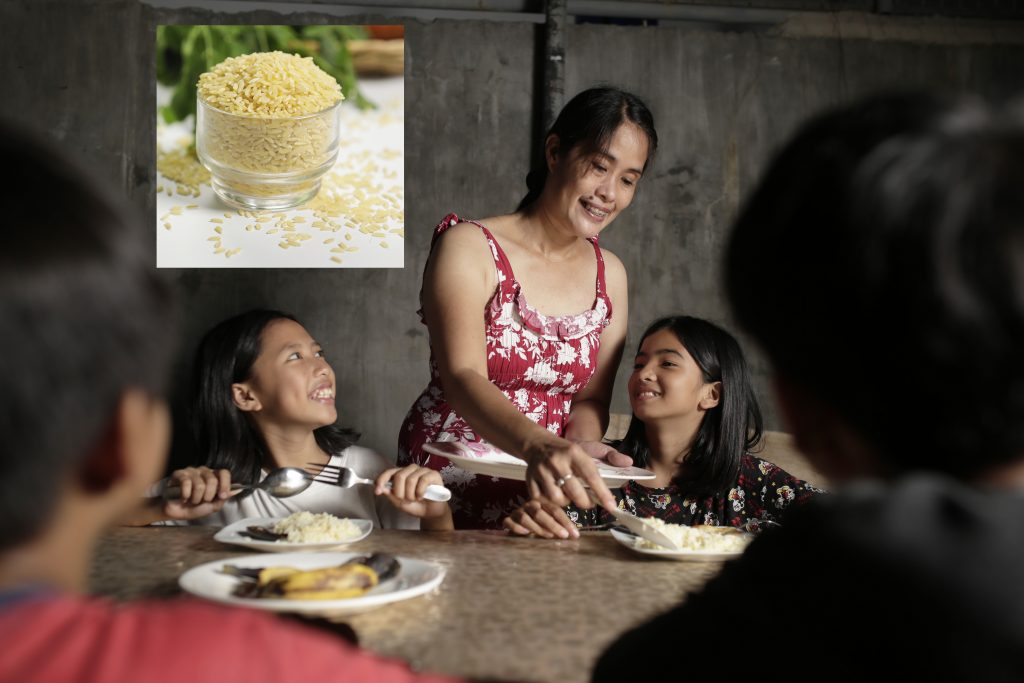
With DA-BPI’s release of the final biosafety approval, Golden Rice is now cleared for commercial propagation.
Science City of Muñoz, Philippines — Filipino rice consumers are close to benefiting from a Vitamin A-infused rice with the approval of its commercial propagation permit.
Dr. John C. de Leon, executive director of the Department of Agriculture-Philippine Rice Research Institute (DA-PhilRice), announced that a biosafety permit for propagating the Golden Rice has been issued on July 21, 2021.
The permit stipulates that Golden Rice has “undergone satisfactory biosafety assessment pursuant to Department of Science and Technology, DA, Department of Environment and Natural Resources, Department of Health, and Department of Interior and Local Government Joint Department Circular No.1, Series of 2016”.
De Leon said that apart from meeting the rigorous standards of biosafety regulation, Golden Rice development follows the standard process of rice breeding, which usually takes 10-12 years before a variety reaches the consumers.
This biosafety approval of Golden Rice is the first authorization for commercial propagation of a genetically engineered rice in South and Southeast Asia.
With this permit, De Leon said that Golden Rice can now be planted for commercial production as per the terms and conditions specified by the DA- Bureau of Plant Industry (DA-BPI).
He clarified though that Golden Rice will still have to seek varietal registration by the National Seed Industry Council (NSIC). NSIC approves the registration of varieties based on consistent good agronomic field performance.
“As always, we are committed to ensuring the highest quality of seed for farmers and a safe and nutritious food supply for all Filipinos,” the PhilRice chief stressed. He elaborated that they will be implementing a comprehensive quality assurance and stewardship program that covers all steps in the chain from seed production, to post-harvest processing, to marketing.
Golden Rice is part of the Healthier Rice Project carried out by DA-PhilRice in partnership with the International Rice Research Institute (IRRI).
“Rigorous research and regulatory review has demonstrated that Golden Rice is as safe as ordinary rice with the added benefit of beta-carotene in its grains” says IRRI Director for Research Dr. Ajay Kohli. “This milestone approval is the product of cross-cutting collaborative work in the agriculture and nutrition sciences, the public sector, and local farming communities, who are all looking forward to seeing Golden Rice reach the tables of those who need it the most.”
De Leon said they will still have to complete the remaining few next steps, such as seed increase, to be able to bring the product forward to farmers and consumers at the soonest possible time.
He emphasized that Golden Rice is developed for humanitarian purposes to help curb vitamin A deficiency (VAD). Hence, De Leon said that they aim to deploy the vitamin-A enriched rice in partnership with appropriate agencies through market-based and programmatic approaches (e.g., feeding program) in areas where the prevalence of vitamin A deficiency is high.
Studies have shown that a one-cup portion of cooked Golden Rice contains enough beta-carotene to meet up to 30-50% of the estimated average requirement of vitamin A for children aged 6 months to 5 years, the group most at risk of vitamin A insufficiency in the Philippines. At present, only 2 out of 10 Filipino households meet the estimated average requirement (EAR) for vitamin A intake in their daily diet.
With its potential to provide a significant amount of vitamin A in the diet, Golden Rice can be an effective complementary approach to achieving the Department of Agriculture’s vision of availability, affordability, and accessibility of quality and nutritious rice for all Filipinos at all times.
Golden Rice has been previously assessed for food safety in five countries, including Australia, New Zealand, Canada, USA and the Philippines.
Click here to view signed Biosafety Permit for Golden Rice Commercial Propagation




